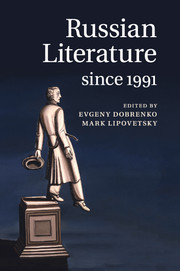Book contents
- Half title page
- Title page
- Copyright page
- Dedication
- Contents
- List of contributors
- Book part
- Chapter 1 The burden of freedom: Russian literature after communism
- Chapter 2 Recycling of the Soviet
- Chapter 3 (Post)Ideological novel
- Chapter 4 Historical novel
- Chapter 5 Dystopias and catastrophe tales after Chernobyl
- Chapter 6 Magical historicism
- Chapter 7 Petropoetics
- Chapter 8 Postmodernist novel
- Chapter 9 Narrating trauma
- Chapter 10 (Auto)Biographical prose
- Chapter 11 The legacy of the underground poets
- Chapter 12 New lyrics
- Chapter 13 Narrative poetry
- Chapter 14 New Drama
- Bibliography
- Index
- References
Bibliography
Published online by Cambridge University Press: 05 November 2015
- Half title page
- Title page
- Copyright page
- Dedication
- Contents
- List of contributors
- Book part
- Chapter 1 The burden of freedom: Russian literature after communism
- Chapter 2 Recycling of the Soviet
- Chapter 3 (Post)Ideological novel
- Chapter 4 Historical novel
- Chapter 5 Dystopias and catastrophe tales after Chernobyl
- Chapter 6 Magical historicism
- Chapter 7 Petropoetics
- Chapter 8 Postmodernist novel
- Chapter 9 Narrating trauma
- Chapter 10 (Auto)Biographical prose
- Chapter 11 The legacy of the underground poets
- Chapter 12 New lyrics
- Chapter 13 Narrative poetry
- Chapter 14 New Drama
- Bibliography
- Index
- References
- Type
- Chapter
- Information
- Russian Literature since 1991 , pp. 284 - 302Publisher: Cambridge University PressPrint publication year: 2015

